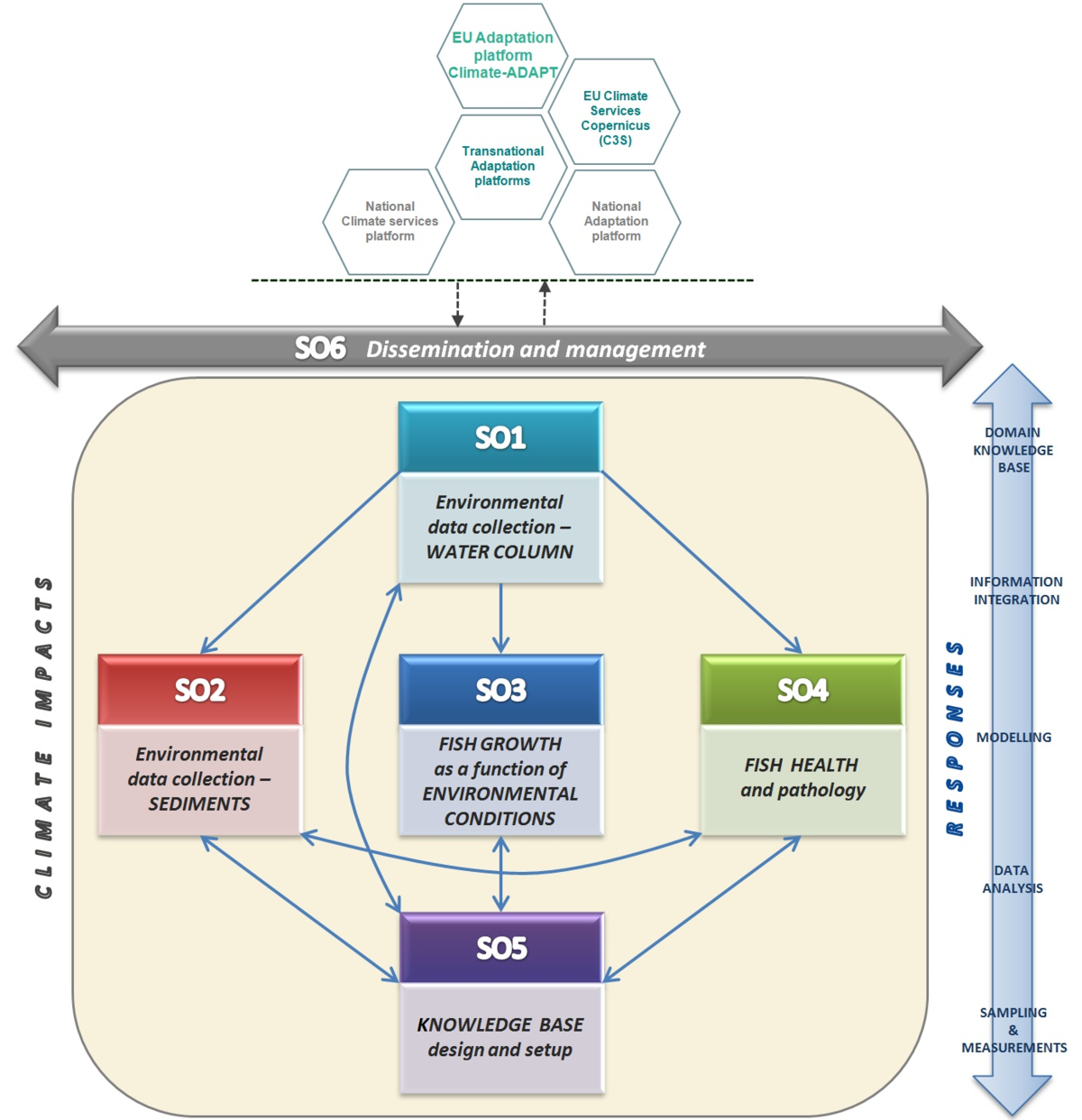Marine finfish aquaculture is an important industry in Croatia with significant growth potential. Since fish are cultured mainly in near-shore cages open to environmental conditions, their growth and well-being, and therefore the aquaculture production, is susceptible to climate change. The effects of the ongoing climate change are becoming increasingly visible, and threaten the viability and development of the aquaculture.
MAIN PROJECT OBJECTIVES
AqADAPT will help turn the threats into an opportunity. Unlike post-hoc reaction that requires immediate substantial investments, preempting the changes by gradually adjusting the infrastructure and the farming process can help absorb costs into regular maintenance and investment cycles. To achieve this, however, a deep understanding of best adaptation measures is required. AqADAPT proposed to significantly contribute to that understanding by conducting fundamental research into imminent threats to the aquaculture, and creating a knowledge base for adaptation of the industry (Figure 1).
Figure 1. Interdependence of specific objectives SO1 - SO6 within the AqADAPT project and communication with data sources (top of the image)
The research will start by focusing on identification of key physical and biological challenges posed by climate change. Climate change may be thought of as a gradual change, but major effects of climate change are typically brought forth by affecting the frequency or severity of extreme events (e.g. reduction in extreme cold that enables invasive species to survive, or extreme weather that changes the habitat and/or reduces fitness of indigenous species).
To properly characterize the environment, we therefore need to understand both the long-term trends, and typical seasonal variations of the environment. Clearly the water column is the primary environment of the fish, but sediment can also play a significant role as a pool of microbial (or otherwise) contamination. Additionally, since water column and sediment are coupled, sediment can be used as a long-term record of conditions in the water column.
The project will therefore investigate both long-term historical trends, and the seasonal cycles in physical characteristics of the water column and sediments. This will be achieved by
- making use of existing data,
- analysis of long-term environmental record through analysis of deep sediment core samples
- continuously recording annual abiotic characteristics of the water column using data loggers,
- seasonal sampling and in-depth analysis of the water column and the sediment,
- seasonal assessment of fish health and microbiological pools of contamination.
The results will be used to forecast trends and variability in the expected environmental conditions for at least three IPCC climate change scenarios. The forecasts will be used as forcing in a physiologically-based fish growth model developed for the purpose. The model will be based on Dynamic Energy Budget (DEB) theory that enables prediction of organismal growth and reproduction as functions of environmental conditions. Additionally, an analysis of threats to fish health and expected trends in pools of microbiological contamination as functions of environmental conditions will be conducted. Finally, predicted effects will be assessed, and recommendations for adaptation will be made for each of the scenarios. The results will be integrated into an on-line knowledge base in a form accessible to scientist, aquaculture producers, and decision-makers.
INTERDISCIPLINARY FUNDAMENTAL AND APPLIED RESEARCH
The project therefore plans both (i) fundamental research resulting in new knowledge, data, and models of interest to scientists, and (ii) applied research aimed at preparing aquaculture industry in Croatia for the changing climate. The interdisciplinary environment, combined with multi-regional research group, will be a great opportunity for development of young researchers (at least one Ph.D, student and one post-doc are expected to participate), and a capacity-building tool for increasing international competitiveness of the research group. An effort will be made to interact with relevant ongoing EU projects (e.g. ClimeFish), with the goal of achieving synergies and joining the consortium(s) in a future EU funding proposal.
COLLABORATING INSTITUTIONS
- Ruđer Bošković Institute, Zagreb, Croatia
- Josip Juraj Strossmayer University of Osijek, Croatia
- Juraj Dobrila University of Pula, Croatia
- University of Zadar - Department of Ecology, Agronomy and Aquaculture, Zadar, Croatia
- Tokyo Institute of Technology, Japan


